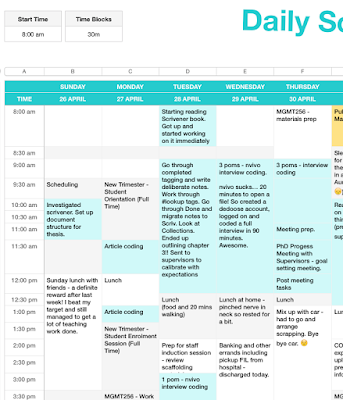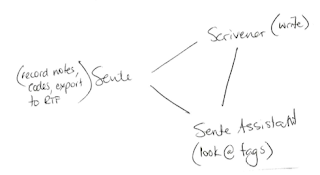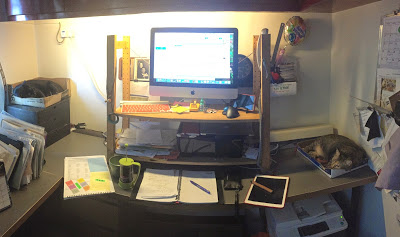I am Stephanie, and This is How I Work
 Today, I am interviewing Stephanie for the “How I Work” series. Stephanie is the Academic Campus Director – South East Asia for the University of Wollongong, and is currently . She currently lectures regionally at Degree and Masters levels, specialising in the area of Logistics Technology, Supply Chain Management, Corporate Social Responsibility, Business Strategy, Project Management, International Business and Systems Thinking & Dynamics. Stephanie is currently completing her PhD in the area of the influence of national culture on logistics decision making in the Asia-Pacific region.
Today, I am interviewing Stephanie for the “How I Work” series. Stephanie is the Academic Campus Director – South East Asia for the University of Wollongong, and is currently . She currently lectures regionally at Degree and Masters levels, specialising in the area of Logistics Technology, Supply Chain Management, Corporate Social Responsibility, Business Strategy, Project Management, International Business and Systems Thinking & Dynamics. Stephanie is currently completing her PhD in the area of the influence of national culture on logistics decision making in the Asia-Pacific region.
Stephanie has almost twenty years’ experience in the areas of manufacturing and distribution, the most recent of which has been concentrated in the areas of business process reengineering and technology. She has extensive experience in Australia, Singapore, Malaysia and Hong Kong in the training of personnel, implementation of systems and solutions and management of Logistics facilities. Her experience originated in the area of Purchasing and Inventory Management and later evolved to Quality Management, Technology, Warehousing and Business Process Reegineering.
Current Job: Academic Campus Director – South East Asia, University of Wollongong
Current Location: Singapore
Current mobile device: iPhone 6 Plus
Current computer: iMac, 21.5 inch, late 2013
Can you briefly explain your current situation and research to us?
I work as a regional adjunct for my university, lecturing an average load of 3 undergraduate classes per year in our Singapore partnership. I also conduct student and adjunct faculty orientations in Singapore and Malaysia, and assist with university marketing efforts in Asia (usually Indonesia, China, Singapore, Malaysia, Vietnam, Philippines, and Thailand).
This ties in nicely with my PhD, where I am investigating the impact of national culture on logistics outsourcing decision making and implementation in multinational corporations in the region. It is a qualitative study and involves interviewing regional and local branch managers.
What tools, apps and software are essential to your workflow?
My laptop and my tablet (iPad) are essential in addition to my home computer. I knew when taking this on that I would be doing a great deal of work on the road. As a result I was lucky enough to get well kitted out with my Macbook Air, and iPad Air. I deliberately bought in to the Mac/Apple architecture, as I wanted to be able to sync things and ensure there was backup for everything in case anything happened (and it did – I lost a proposal document, but fortunately it was backed up on another device). So with this in mind the apps I selected had to work across multiple platforms as well.
As with most candidates, we usually start with the literature, and after evaluating a few alternatives, I went with Sente for paper/reference management. Its tagging, ability to read, comment and highlight articles on my iPad and syncing were key in this decision. A lot of the others just didn’t have the sophistication. I occasionally will use Mendeley desktop as it has some good capability when in comes to searching for literature, but I keep coming back to Sente as my main library manager.
I did struggle with workflow, however, until I discovered the Sente Assistant, and the OPML/RTF exporter for Sente. The Assistant allows tagging on individial comments, which allows for good visualisation of tags and notes. From here I can get a 10000 ft view of my literature. Something akin (I’ve heard) to results people can get in nvivo, however I felt in my limited exposure to nvivo that using the Sente/Sente Assistant combination was more verbose. (aside – a bit like this response – sorry).
I’ve also found that it is really necessary for me to take “Thesis-ready notes” (see the Thesis Whisperer for more information on this). Then I export those notes to Scrivener (using the OPML/RTF converter), where I try and tag and massage them in to sentences and paragraphs. So basically I spend a log of time going around these three:
I’m only just getting back to some writing after doing data collection. So I’m doing a lot of coding (in Dedoose, I gave up on nvivo due to the virtual environment/Windows software being too slow, and the Mac version being too cut down to be useful), and revisiting of the literature at the moment.
What does your workspace setup look like?
I have a fixed workspace and a travel “kit” so I can take everything on the road.
My Home Space
My home space is pictured below. I added some Ikea shelves to make it more or less a standing desk. I can adjust it to sit for a while if necessary (which is apparently advisable). I have my two assistants (which occasionally get mentions on Twitter at #academicswithcats).
My travel “kit” is basically my Macbook Air, iPad Air, stylus (I love the Pencil by 53 stylus), my sketch pad and post-its (which I use for mapping out ideas). A notebook (which I usually photograph and file), which may seem strange but somehow the paper notebook to track to dos and schedule keeps me focused. Plus all the associated adapters and dongles, as I often have to teach or present when I travel.
I alos invested in a Zoom iQ5 External Microphone For iPhone. It seriously improves the sound quality of interviews. And I record using both my iPhone and iPad so that I have a backup in case one or the other doesn’t pick up or record fully.
What is your best advice for productive academic work?
Touch your thesis / research every day. I was a key part of the organisation team for a conference we held in March. In the run up to that, I was so focused on that event that I lost some serious time. I got some help and have been scheduling and logging my time so I can see where it’s going. I basically need to touch my thesis every day – even 30 mins using the pomodoro technique to tidy up things I’d flagged as #lookup or #todo, or reading one more article – just to keep it in mind and removing the fear that I had built up after not looking at it for way too long.
How do you keep an overview of projects and tasks?
Tagging is key for me, as almost everything is electronic, and I schedule time daily using a simple spreadsheet.
 |
| Weekly schedule in a spreadsheet |
I usually tag #lookup or #todo in Sente or Scrivener. That way I can do a search to see what is outstanding. I do a sweep of these tags and then put together daily tasks (which I keep track of in my paper-based notebook), and a weekly schedule (spreadsheet). I have a #todo file in Scrivener which I use to capture things that might not be a part of the document itself. Sente also has #todo and #lookup tags, so at the moment I find myself circulating between Sente, Sente Assistant and Scrivener. As I get closer to closure this might concentrate in one place.
I used to think that this all had to be in one place, however I spent more time looking for the perfect system than actually doing any research. I finally just accepted the messiness.
Besides phone and computer, do you use other technological tools in work and daily life?
I could not live without my iPad. It’s a content creation tool for me – I lecture from it (Keynote and Explain Everything), I draw in it (Paper by 53), I take notes in it (Notability) and read and annotate PDFs (Sente and Goodreader).
I have a cheap dual-SIM Android which I use when I travel as internet access is paramount for me and I need a local SIM wherever I go so that I can immediately back up interviews. This was one of the agreed backup processes my supervisors and I came up with in order to (a) get data off my devices to protect privacy and (b) minimise data loss.
Which skill makes you stand out as an academic?
I think my strong links with industry, ability to network and use of technology. I’m not sure that my research skills are developed enough to say more than that – I am in a research “apprenticeship” (PhD) after all. But I think my connections and ability to use technology to get things done quickly are standing me in good stead so far.
What do you listen to when you work?
At the moment, Spotify “Beats to Think To” channel. I tend to like music that doesn’t have lyrics. Although if I’m really stuck on something I might turn that off.
\What are you currently reading? How do you find time for reading?
For pleasure? Rich Man’s War. I love science fiction. Reading is what I use to go to bed – it’s part of my ‘go to bed’ process. If I don’t read, then I’d probably have trouble falling asleep. It’s only 5-10 minutes a night at the moment, but that’s enough.
Are you more of an introvert or extrovert? How does this influence your working habits?
I was once told I’m an introvert that works very hard at being an extrovert. I’m not sure I really identify with either camp, however I find that doing large amounts of writing involves seclusion, and that usually means that I end up under-socialised.
If I need contact, I seek it. Sometimes this results in a long lunch which can blow my schedule sometimes. Other times I need to get work done, so I blow off lunch with friends. It ebbs and flows with my work needs at the moment.
What’s your sleep routine like?
I guard it – around 11pm to bed. Wake up about 7:30am. Sometimes I may not sleep until closer to noon, but I have the advantage of working from home … and my supervisors gave me permission (kidding – they just suggested) to have a 20 minute afternoon nap if I need. Thinking is hard work!
What’s your work routine like?
At the moment it’s about 50-70% of my working day on my thesis. The rest of the time on university or personal work. That changes next week when trimester commences and my lecturing will take up most of my day (and nights for part timers). With that I will spend 30-60 mins per day on my thesis. Such is adjunct life.
What’s the best advice you ever received?
Actually it was a quote my coach sent me:
“The common model of writing I grew up with preaches control. It tells me to think first, make up my mind what I really mean, figure out ahead of time where I am going, have a plan, an outline, don’t dither, don’t be ambiguous, be stern with myself, don’t let things get out of hand. As I begin to try to follow this advice, I experience a sense of satisfaction and control: ‘I’m going to be in charge of this thing and keep out of any swamps!’ Yet almost always my main experience ends up one of *not* being in control, feeling stuck, feeling lost, trying to write something and never succeeding. Helplessness and passivity. The developmental model, on the other hand, preaches, in a sense, *lack* of control: don’t worry about knowing what you mean or what you intend ahead of time; you don’t need a plan or an outline, let things get out of hand, let things wander and digress. Though this approach makes for initial panic, my overall experience with it is increased control.” (Elbow 1973, 32-33) cited in Belcher 2009, p172.
Elbow, Peter. 1973. *Writing Without Teachers.* Oxford: Oxford University Press.
Belcher, Wendy Laura. 2009. *Writing Your Journal Article in 12 Weeks: A Guide to Academic Publishing Success.* SAGE: Thousand Oaks, CA.


